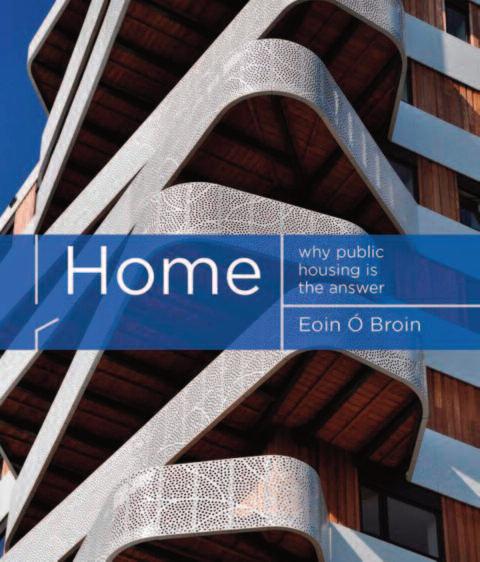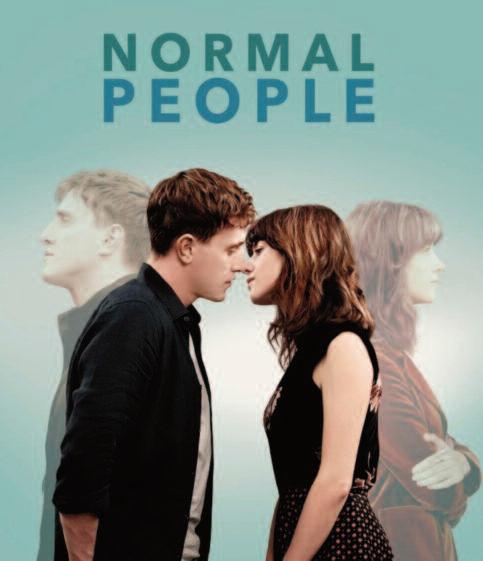
7 minute read
REVIEWED BY DANIEL WALDRON
Home
By eoin Ó Broin
Merrion Press, 2019
reviewed by Michael O’Brien
Though published in early 2019, Sinn Féin’s surge in this year’s general election fuelled a fresh spike in sales of this book pushing it back into the best sellers’shelves.
Eoin Ó Broin has been Sinn Féin’s housing spokesperson since his entry into the Dáil in 2016. In some measure this book documents his activity in the Dáil around the issue, particularly on the Special All Party Committee on Housing and Homelessness that was established shortly after the 2016 general election and subsequently on the Oireachtas Committee for Housing, Planning and Local Government.
Two of three main sections give an informative history of official housing policy in Ireland from the late 19th century to the present. This takes us from the land reforms of the British government in response to the agitation of the Land League, to the alternating Fine Gael and Fianna Fáil dominated governments throughout the history of the state.
Positive lessons, relevant to the present, can be drawn from how mass protest action and agitation can force upon reluctant government’s improvements in the housing situation. Curiously Ó Broin makes only a passing reference to the Dublin Housing Action Committee active in the 1960s and early 70s. Their direct action and agitation led by left-wing and labour movement activists presaged the last major public housing projects in the state in the 1970s, such as Tallaght and Clondalkin.
Ó Broin does provide a sense of proportion about the performance of the governments in the early decades of the state when it comes to public housing. relative to what preceded in the early 20th century and the pitiful levels of public housing delivery over recent decades it is understandable that the capacity of governments to annually deliver thousands of public homes, particularly from the 1930s to the 1970s, has been a useful propaganda point.
However, even throughout this period what resources that were put into public housing were heavily outweighed by state support and grants for people seeking to be homeowners. Though not fully explored in this book at the heart of this policy was a desire by governments to construct what they saw as a middle class home-owning bulwark.
The detailed tracking of changes in housing policy and the role of private finance in the housing sector from the 1980s onwards is particularly useful. The acute accommodation crisis we have endured since 2013 is the culmination of processes going back much further. This began with the depletion of public housing stock through tenant buyout schemes, underinvestment in new public housing stock, uncontrolled land prices, the activities of institutional investors, under-spending of Traveller accommodation budgets and the existence of Direct Provision. These have all combined to leave vast numbers of people locked out of public housing and unable to buy a home at an affordable price and in intolerable situations.
The third part of the book where Ó Broin sets out his alternative is at best a mixed bag. The measures he proposes would clearly improve the situation. However, Ó Broin’s position that resolving the housing crisis once and for all can be done within the fiscal restrictions and without fundamentally challenging the capitalist market is a miseducation of the reader. It speaks a great deal to O’Broin and Sinn Féin’s political trajectory.
Punches are consistently pulled in this section. A free pass is given to Approved Housing Bodies, which should be superfluous in a socialist housing solution. The strike of investment of private developers he argues should be dealt with by a punitive land tax, rather than these lands being nationalised (with no compensation) by the state. He envisages an ongoing place for private rented accommodation and a landlord class, albeit reduced in size in the context of an overall solution. It is true that within an overall accommodation solution you need provision for short term letting for students and for short to medium term migrant workers, but there is no reason why this category can’t be provided for publicly.
We are prepared for measures that fall short at the start. The philosophy Eoin Ó Broin brings to bear in this book is spelled out at the end of the‘overture’(rather than‘preface’ , ‘chapters’and‘epilogue’the book is bizarrely structured like a piece of classical music with ‘overture’ , ‘movements’and‘coda’!)
“Somewhere between the sincerity of inadequate amelioration and the energy of impossibilist rupture lies
a pathway to a functional housing system that guarantees all people a place they can call home. ”[my emphasis]
In plainer speak this is a dig against the socialist left who situate the housing crisis as a manifestation of capitalism and see the permanent solutions lying in socialist policies. This means breaking with the economic status quo through organising and building a
Normal People
Directed by Lenny abrahamson
BBC 3, 2020
reviewed by Harper Cleves
Sally rooney’s novel Normal People and Lenny Abrahamson’s BBC adaptation of this novel have been the subject of widespread adoration and controversy. Criticisms hurled at both works have ranged from hailing rooney as‘the Marxist voice of a generation’to diminishing both the novel and screen adaptation to a series of ’longing stares exchanged’between‘extremely privileged people. ’reviews tend to over-focus on either the micro-detail of the relationship between the two protagonists, or the capital‘P’Politics (or lack thereof) in both works. Both contain a certain truth, and yet neither captures the nuance, and the interplay of the detail and the broader context in which these two protagonists exist and fall in love.
The novel and the series (which rooney co-wrote), follows the relationship between Marianne and Connell (played by Daisy Edgar Jones and Paul Mescal respectively). Both attend the same secondary school in Sligo, but come from drastically different backgrounds.
Marianne comes from a wealthy family. Her mother is a solicitor, as was her father, who has passed away. The tension in the family is clear from the onset, without being explicitly stated. The older brother hovers menacingly at the edges of frames as the mother sits expressionless in the next room. Marianne eventually reveals to Connell that her father was physically abusive.
Connell, by contrast, is from a working class background. His mother works as a cleaner for Marianne’s family. He is the product of an accidental teen pregnancy, and his father is not in the picture. His home environment by contrast is warm. His mother, Lorraine (played by Sarah Greene) teases him about his romantic life and is frank with him when he disappoints her. Connell ends each phone call and interaction with his mother with a routine‘I love you. rooney is often hailed as a Marxist writer, and the influence of Marxism can be felt in her works. In Normal People, Connell recommends that Marianne read The Communist Manifesto. Marianne makes passing mass movement based on working-class struggle. Despite the vast resources at its disposal Sinn Féin have been unwilling to build such a movement.
There is acknowledgement of the role of social movements but at best in the eyes of Ó Broin they are there to assist the struggle for immediate reform as an end in itself. For him and his party the capitalist system is to be accepted as a given.n

comments on overproduction under capitalism. In rooney’s debut novel, Conversations with Friends, one of the characters explains Engels’theory on the development of the patriarchal family. One of the criticisms leftists have made of Abrahamson’s adaption of the series is that the removal of such components depoliticised the work. I would disagree. Much has been said about the exploration of class by rooney. It was these explorations that Abrahamson mastered. Connell experiencing the alienation of attending courses with people who abstractly discuss issues of material wealth will be a familiar experience for many working-class people attending university. Meanwhile, Marianne finds herself initially comfortable and popular for the first time in her life. Abrahamson does a particularly striking job of jumping between these two perspectives in the pool party scene. When Connell is feeling out of place amidst ruminations on summer holidays to Barcelona and Berlin, the scene feels as if it is in slow motion. Marianne, at home in the wealth, but insecure in her ability to have genuine human connections, perceives Connell’s discomfort as indifference to her. In rooney’s novel it was these moments that stuck in my mind a year later. references to The Communist Manifesto,










